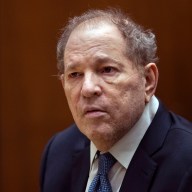WASHINGTON – A year ago this week, Barack Obama was swept into power on a promise of hope and change in a monumental election for a country with a painful history of slavery and segregation.
But in the 10 months since his inauguration, the political landscape in the United States is as partisan and polarized as ever, with the explosive issue of race even occasionally tinging some of the fiercest criticism directed Obama’s way.
On election night last November, Obama assured a sea of cheering Americans in his hometown of Chicago: “Change has come.”
In recent weeks he’s acknowledged just how difficult it’s been to bring about that change.
“Change is hard,” the president said last week as he signed a bill slashing wasteful defence spending.
Blame the Republicans, one of his top advisers said Sunday.
“What we’ve seen from the Republicans is really the desire to have the status quo,” Valerie Jarrett said on ABC’s “This Week.”
The president, Jarrett said, has “reached out. He’s listened. He’s reached across the aisle … ultimately it’s up to the Republicans to decide if they want to be a constructive force and come to the table and work with us in a positive way. The door is always open.”
But Toni-Michelle Travis, a political science professor at George Mason University, says it was naive for anyone to expect Obama to change the way Washington operates.
“We had everybody – from the average voter to politicians – who had expectations that were far too high. Those who know Washington know it runs on money, and that means lobbyists, and that means hard-fought battles on every front, in particular the fight over health-care reform,” she said Sunday.
“It’s very hard to change Washington. You can run on it, and people will believe you, but I think even Obama was naive about how much he could do.”
Domestically, Obama had an early success shortly after his inauguration – he managed to get a $787 billion economic stimulus package through Congress, resulting in a major cash injection into the free-falling economy that his top economic advisers say is now beginning to bear fruit.
But the battle over health-care reform has been a protracted and nasty one, reaching fever pitch during a series of town hall meetings this summer that featured some conservative protesters hoisting signs depicting their new president as an African witch doctor. Some of those same critics spent months falsely accusing Obama of sitting in the Oval Office fraudulently, claiming he was born in Kenya, not Hawaii.
And despite Obama’s pledge to do things differently in Washington, some of the White House’s tactics haven’t differed dramatically from those of previous administrations. Whether it’s making backroom deals with the health insurance lobby or declaring war on Fox News – where the president has been compared to Karl Marx, Adolf Hitler and Richard Nixon by various talking heads – Obama’s inner circle hasn’t exactly done away with old-school politics.
Nor has Obama’s election had any significant impact on race relations in the United States.
A new Gallup poll suggests the majority of those surveyed, 56 per cent, believe that a solution to America’s race-relations problem will eventually be worked out – almost exactly the same number as in 1963, when Gallup first started asking the question in the midst of the civil rights movement.
That’s down more than 10 percentage points from last Nov. 5 – the day after Obama’s election, when 67 per cent of Americans polled by Gallup believed that a resolution to the country’s race relations problems was in sight.
The fading hopes were most marked among African-Americans in the Gallup poll: only 42 per cent of respondents said a solution will eventually be worked out compared with 50 per cent of those surveyed in June and July of 2008, after it was clear that Obama would win the Democratic nomination.
“A year after his election, with all the hope of Americans coming together, the great symbolism of having an African-American president – I don’t think we’ve lost that, I just think we’ve sobered up to reality,” Rev. Al Sharpton said Sunday on “This Week.”
Sharpton said despite Obama’s historic accomplishment, the U.S. is still far from colour-blind.
“The structural inequality is still there,” Sharpton said. “The reality is you still see the race gap in education, in employment, in health care … the reality has sobered a lot of people up.”
Obama, as always, has been mindful to tread carefully around race, and has said he disagrees with suggestions from former president Jimmy Carter and others that some of the conservative attacks against him have been race-related.
“I think it’s important to realize that I was actually black before the election,” he told David Letterman in September.
Despite the difficulties of his first year, Obama’s approval ratings sit consistently at about 50 per cent, considered impressive given the U.S. is inching towards a double-digit unemployment rate amid the worst economic recession in decades. Bill Clinton was at 48 per cent at this stage of his presidency, while George W. Bush was at a record high of 88 per cent, six weeks after 9-11.
Obama’s approval ratings will likely climb higher once he gets a health-care reform package, Travis predicts – a feat no president before him has been able to achieve.
“That will be his big success,” she said.
“The messiness surrounding how he got the bill will fade after a year or two. The partisanship has been bitter on this one, but he’ll get there, and he’ll be celebrated for it once people who don’t have coverage suddenly have affordable coverage and realize that all the fear-mongering surrounding it was just that.”















